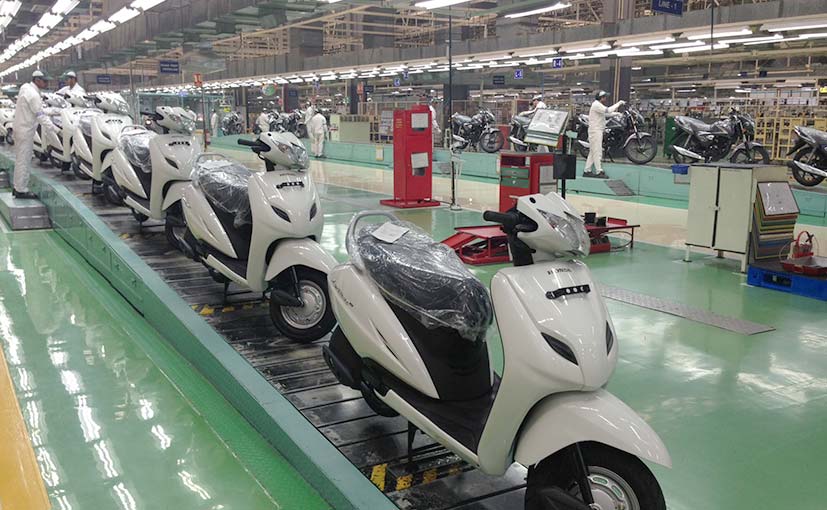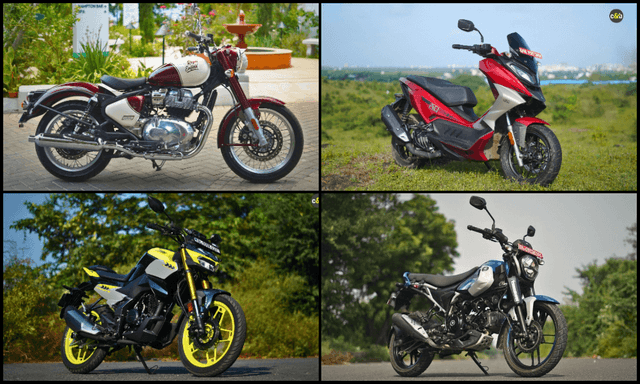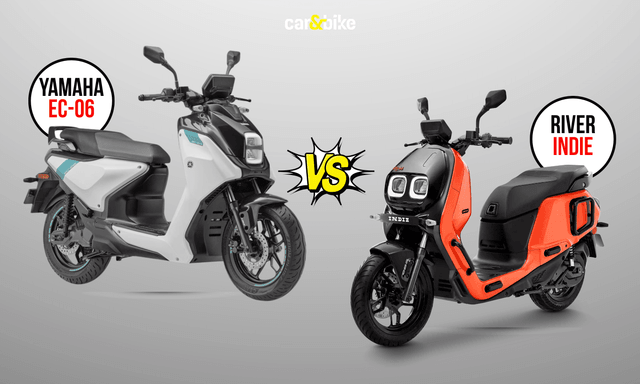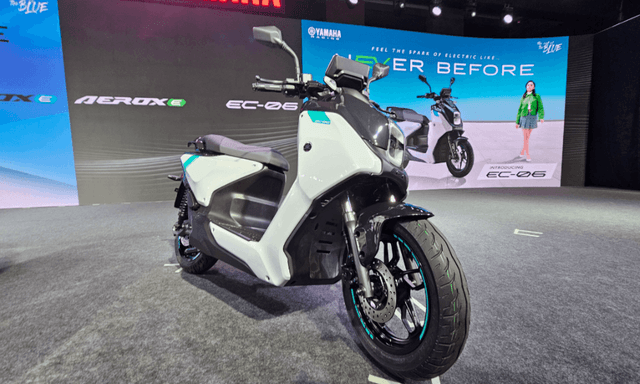Automobile OEMs Will Be Given Clear Roadmap For Electrification, Says Niti Aayog

- Niti Aayog says government will look at reactions to draft proposal
- Niti Aayog has proposed electrification of two-wheelers by 2025
- Government has earmarked Rs. 10,000 crore for electrification project
Niti Aayog, the government's think-tank had put up a proposal to ban all two-wheelers with internal combustion engines by 2025, and all three-wheelers with internal combustion engines by 2023. The CEO of Niti Aayog Amitabh Kant has now said that it's still a draft proposal and the government will consider all reactions and recommendations from automobile manufacturers before a policy decision is taken. The government proposal is aimed at curbing vehicular pollution, as well as reduce dependency on fossil fuels. But now the Niti Aayog CEO has clarified that two-wheeler manufacturers will be given sufficient time to roll out the next generation vehicles meeting the latest Bharat Stage VI (BS6) emission regulations.
Also Read: Proposal To Make Two-Wheelers Electric Has Challenges

Amitabh Kant, CEO, Niti Aayog was the chief guest at the flagging off of Mahindra eVerito cabs by Blu Smart, India's first electric taxi service
"BS-VI is coming in now, and we should give ample time for this transition for BS-VI. Our view is that for three-wheelers going electric by 2023 and two-wheelers by 2025. When you converge this with the FAME II Scheme, the government is supporting electrification, the government is providing support. Our view is that the future is electric, the future is sharing. We should be able to clean up our cities, we have some of the most polluted cities, so we should clean up our cities," said Amitabh Kant, CEO, Niti Aayog.
Also Read: Will Banning Internal Combustion Engines Help The Case Of Electric Three-Wheelers?

The Niti Aayog has proposed the replacement of all two-wheelers below 150 cc with electric two-wheelers by 2025
The bulk of India's automobiles comprise of two-wheelers, and manufacturers are already going through a transition to meet the latest BS-VI emission regulations which will come into force from April 2020. The Niti Aayog chief said that the industry will be given a roadmap to prepare to meet electrification even when manufacturers are already going through a period of disruption to make all automobiles BS-VI ready. As things stand today, only niche players have electric two-wheeler products which are production ready. The major two-wheeler manufacturers still don't have a production-ready electric two-wheeler product.
Also Read: Niti Aayog Proposes Electrifying Two-Wheelers And Three-Wheelers
"We are giving a long roadmap, so people who have invested in BS-VI will be able to generate adequate revenue from that, and we're looking only at six years from now. As the country moves, the quality of lives of the citizens of India must improve. We're trying to come out with a policy framework which is consistent, which is predictable, which lays down a clear roadmap for the future.
"This will not cause further chaos. We are talking about six years hence, not now. But we need to lay down a clear roadmap for the future and that is what we're laying down, so that everybody should prepare to clean up our cities. Your life and the quality of life of all of us, is far more important. We're also pushing not just for EVs, but for sharing and for a connected world," the Niti Aayog chief added.

Companies like Ather Energy are first movers in the Indian electric two-wheeler space
The automobile sector contributes to 50 per cent of India's manufacturing industry. India is the world's second largest car industry and is the leading two-wheeler industry in the world. The government says that it should play the role of a facilitator and catalyst to make the transition to electric a smooth one, and to drive through a connected world of shared mobility. Around 40-50 per cent of the electric vehicle industry is the manufacture of batteries. The government is looking at ways to facilitate make in India for batteries, and to push for battery value addition in India, and to push for the right ecosystem and the right policy framework. Additionaly, public transportation, like buses will be moved to electric which will be offered on lease to different states, and cities will be encouraged to adopt electric buses, the Niti Aayog chief said.
Latest News
 car&bike Team | Feb 2, 2026Car Sales January 2026: Six Marutis in Top 10, But Tata Nexon Takes Top SpotTata Motors sold 23,365 units of the Nexon, creating a clear gap to the Maruti Suzuki Dzire, which finished second with 19,629 units.1 min read
car&bike Team | Feb 2, 2026Car Sales January 2026: Six Marutis in Top 10, But Tata Nexon Takes Top SpotTata Motors sold 23,365 units of the Nexon, creating a clear gap to the Maruti Suzuki Dzire, which finished second with 19,629 units.1 min read car&bike Team | Feb 2, 2026Maruti Suzuki Victoris Crosses 50,000 Sales Milestone In 4 monthsThe compact SUV launched at the onset of festive season has crossed the 50,000 sales mark in about 4 months1 min read
car&bike Team | Feb 2, 2026Maruti Suzuki Victoris Crosses 50,000 Sales Milestone In 4 monthsThe compact SUV launched at the onset of festive season has crossed the 50,000 sales mark in about 4 months1 min read car&bike Team | Feb 2, 2026Two-Wheeler Sales January 2026: Hero MotoCorp, TVS, Royal Enfield, Suzuki Report Sustained GrowthMost brands have reported year-on-year growth in the first month of CY26.2 mins read
car&bike Team | Feb 2, 2026Two-Wheeler Sales January 2026: Hero MotoCorp, TVS, Royal Enfield, Suzuki Report Sustained GrowthMost brands have reported year-on-year growth in the first month of CY26.2 mins read car&bike Team | Feb 2, 2026Maruti Suzuki Announces Price Protection Amid Long Waiting PeriodsCountry’s largest carmaker has said that prices of the cars will not be increased for customers who have already made the bookings1 min read
car&bike Team | Feb 2, 2026Maruti Suzuki Announces Price Protection Amid Long Waiting PeriodsCountry’s largest carmaker has said that prices of the cars will not be increased for customers who have already made the bookings1 min read Jafar Rizvi | Feb 2, 2026Yamaha EC-06 vs River Indie: How Different Are The Two Electric Scooters?The EC-06 shares its foundation with the River Indie, and here we look at the differences between the two.3 mins read
Jafar Rizvi | Feb 2, 2026Yamaha EC-06 vs River Indie: How Different Are The Two Electric Scooters?The EC-06 shares its foundation with the River Indie, and here we look at the differences between the two.3 mins read Jafar Rizvi | Feb 2, 2026Yamaha EC-06 E-Scooter Launched In India At Rs 1.68 LakhThe EC-06 marks Yamaha’s entry into the electric scooter segment in India.2 mins read
Jafar Rizvi | Feb 2, 2026Yamaha EC-06 E-Scooter Launched In India At Rs 1.68 LakhThe EC-06 marks Yamaha’s entry into the electric scooter segment in India.2 mins read
 Preetam Bora | Feb 2, 2026TVS NTorq 150 Road Test Review: Bigger, Better & More Efficient!We test the new TVS NTorq 150 out in the real world to get a sense of what it offers in terms of performance, dynamics and fuel economy.7 mins read
Preetam Bora | Feb 2, 2026TVS NTorq 150 Road Test Review: Bigger, Better & More Efficient!We test the new TVS NTorq 150 out in the real world to get a sense of what it offers in terms of performance, dynamics and fuel economy.7 mins read Bilal Firfiray | Jan 21, 2026Tata Punch Facelift Review: New Turbo Engine; Same Old SoulWith the update, the Tata Punch facelift retains its character of being a healthy runabout, which is perfect for Indian roads. But have these changes made it any better?7 mins read
Bilal Firfiray | Jan 21, 2026Tata Punch Facelift Review: New Turbo Engine; Same Old SoulWith the update, the Tata Punch facelift retains its character of being a healthy runabout, which is perfect for Indian roads. But have these changes made it any better?7 mins read Amaan Ahmed | Jan 17, 2026Bajaj Chetak C25 First Ride Review: Basic, Likeable E-Scooter For First-Time RidersThe Chetak C25, in quite a few ways, is poles apart from the larger and more powerful 30 and 35 Series models, but in its mannerisms, it is very much a Chetak.8 mins read
Amaan Ahmed | Jan 17, 2026Bajaj Chetak C25 First Ride Review: Basic, Likeable E-Scooter For First-Time RidersThe Chetak C25, in quite a few ways, is poles apart from the larger and more powerful 30 and 35 Series models, but in its mannerisms, it is very much a Chetak.8 mins read Bilal Firfiray | Jan 9, 2026Toyota Urban Cruiser Hyryder: 10,000 km Long-Term ReviewAfter spending over three months and 10,000 km with the Toyota Urban Cruiser Hyryder Hybrid, we were impressed by its real-world mileage, seamless hybrid, practical comfort, and Toyota reliability. Is it the best C-SUV then?5 mins read
Bilal Firfiray | Jan 9, 2026Toyota Urban Cruiser Hyryder: 10,000 km Long-Term ReviewAfter spending over three months and 10,000 km with the Toyota Urban Cruiser Hyryder Hybrid, we were impressed by its real-world mileage, seamless hybrid, practical comfort, and Toyota reliability. Is it the best C-SUV then?5 mins read Seshan Vijayraghvan | Jan 8, 20262026 Mahindra XUV 7XO Review: Big On Tech, Bigger On ComfortThe new Mahindra XUV 7XO is flashier, feature packed, and comes with more advanced tech. But are the changes just incremental or actually substantial?1 min read
Seshan Vijayraghvan | Jan 8, 20262026 Mahindra XUV 7XO Review: Big On Tech, Bigger On ComfortThe new Mahindra XUV 7XO is flashier, feature packed, and comes with more advanced tech. But are the changes just incremental or actually substantial?1 min read


























































































































